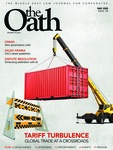Landmark publication by the DRA

‘Commentaries on the DIFC Laws’ sets the groundwork for further evolution in commercial law, fixing a reference point for long-term development in line with leading common law courts.
The Dispute Resolution Authority Academy of Law has published the first-ever analysis in the Middle East of English language common law created by the DIFC Courts. Designed to guide the legal sector on the rapidly-emerging legal principles and practices set by DIFC Courts since 2008, “Commentaries on the DIFC Laws” represent an important milestone in the development of the commercial court.
Their publication sets the groundwork for further evolution in commercial law, fixing a reference point for long-term development along the lines set by the world’s premier league of commercial courts, such as England & Wales.
DIFC Courts Chief Justice Michael Hwang said, “The publication of this first volume of Commentaries is a mark of the growing maturity of our courts and aligns us with the world’s most established common law jurisdictions. As DIFC common law jurisprudence literally emerges with every new judgment, the need for thoughtful legal analysis becomes imperative for judges, lawyers, and academicians who seek research materials and guidance. This is the key role these commentaries were intended to fulfill, while this body of legal analysis may also provoke new ideas that in turn promote the ongoing development of regional commercial laws and business practices.”
International law firms Jones Day, Clyde & Co, Clifford Chance, Stephenson Harwood, and the late barrister Stephen Field, wrote commentaries on the most widely used statutes: DIFC Companies Law (Jones Day), DIFC Arbitration Law (Clyde & Co), DIFC Law of Damages and Remedies (Clyde & Co), DIFC Law of Obligations (Clifford Chance), DIFC Employment Law (Stephenson Harwood), DIFC Courts Law (Stephen Field).
David Gallo, Director of the Academy of Law, said, “Publishing these Commentaries was only possible thanks to the hard work and academic contributions of a team of authors from some of the major Dubai-based law firms, and we extend our sincere thanks to all those involved. We would like to pay a special tribute to the late Stephen Field who contributed to the commentaries in an individual capacity and who sadly passed away last year. This first volume of commentaries is dedicated to Stephen’s memory.”
The Academy of Law will commission commentaries on remaining areas of DIFC Laws, and keep the existing commentaries refreshed as the knowledge and application of the laws develop alongside business and technological change.

























































































































